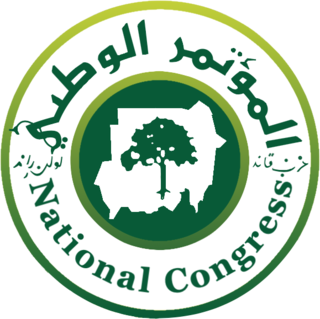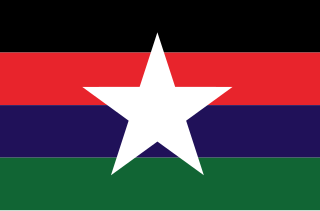
Darfur is a region of western Sudan. Dār is an Arabic word meaning "home [of]" – the region was named Dardaju while ruled by the Daju, who migrated from Meroë c. 350 AD, and it was renamed Dartunjur when the Tunjur ruled the area. Darfur was an independent sultanate for several hundred years until it was incorporated into Sudan by Anglo-Egyptian forces in 1916. As an administrative region, Darfur is divided into five federal states: Central Darfur, East Darfur, North Darfur, South Darfur and West Darfur. Because of the War in Darfur between Sudanese government forces and the indigenous population, the region has been in a state of humanitarian emergency and genocide since 2003. The factors include religious and ethnic rivalry, and the rivalry between farmers and herders.
The Janjaweed are a Sudanese Arab militia group that operate in Sudan, particularly Darfur, and eastern Chad. Using the United Nations definition, the Janjaweed comprise Sudanese Arab tribes, the core of whom are from the Abbala background with significant recruitment from the Baggara people. This UN definition may not necessarily be accurate, as instances of members from other tribes have been noted.

The Justice and Equality Movement is an opposition group in Sudan founded by Khalil Ibrahim. Gibril Ibrahim has led the group since January 2012 after the death of Khalil, his brother, in December 2011. JEM's political agenda includes issues such as: radical and comprehensive constitutional reform to grant Sudan's regions a greater share of power in ruling the country, the replacement of social injustice and political tyranny with justice and equality, and basic services for every Sudanese.

The National Congress Party was a major political party that dominated domestic politics in Sudan from its foundation until the Sudanese Revolution.

The Sudan Liberation Movement/Army is a Sudanese rebel group active in Darfur, Sudan. It was founded as the Darfur Liberation Front by members of three indigenous ethnic groups in Darfur: the Fur, the Zaghawa, and the Masalit, among whom were the leaders Abdul Wahid al Nur of the Fur and Minni Minnawi of the Zaghawa.

Dr. Khalil Ibrahim was a Sudanese insurgent leader who was the founder of the Justice and Equality Movement (JEM).

The African Union Mission in Sudan (AMIS) was an African Union (AU) peacekeeping force operating primarily in the country's western region of Darfur to perform peacekeeping operations related to the Darfur conflict. It was founded in 2004, with a force of 150 troops. By mid-2005, its numbers were increased to about 7,000. Under United Nations Security Council Resolution 1564, AMIS was to "closely and continuously liaise and coordinate ... at all levels" its work with the United Nations Mission in Sudan (UNMIS). AMIS was the only external military force in Sudan's Darfur region until UNAMID was established. It was not able to effectively contain the violence in Darfur. A more sizable, better equipped UN peacekeeping force was originally proposed for September 2006, but due to Sudanese government opposition, it was not implemented at that time. AMIS' mandate was extended repeatedly throughout 2006, while the situation in Darfur continued to escalate, until AMIS was replaced by UNAMID on December 31, 2007.

The Eastern Front is a coalition of rebel groups operating in eastern Sudan along the border with Eritrea, particularly the states of Red Sea and Kassala. The Eastern Front's Chairman is Musa Mohamed Ahmed. While the Sudan People's Liberation Army (SPLA) was the primary member of the Eastern Front, the SPLA was obliged to leave by the January 2005 Comprehensive Peace Agreement that ended the Second Sudanese Civil War. Their place was taken in February 2004 after the merger of the larger Beja Congress with the smaller Rashaida Free Lions, two tribal based groups of the Beja and Rashaida people, respectively. The Justice and Equality Movement (JEM), a rebel group from Darfur in the west, then joined.

The most recent Chadian Civil War began on December 18, 2005. Since its independence from France in 1960, Chad has been swamped by the civil war between the Arab-Muslims of the north and the Sub-Saharan-Christians of the south. As a result, leadership and presidency in Chad drifted back and forth between the Christian southerners and Muslim northerners. When one side was in power, the other side usually started a revolutionary war to counter it.

The War in Darfur, also nicknamed the Land Cruiser War, is a major armed conflict in the Darfur region of Sudan that began in February 2003 when the Sudan Liberation Movement (SLM) and the Justice and Equality Movement (JEM) rebel groups began fighting against the government of Sudan, which they accused of oppressing Darfur's non-Arab population. The government responded to attacks by carrying out a campaign of ethnic cleansing against Darfur's non-Arabs. This resulted in the death of hundreds of thousands of civilians and the indictment of Sudan's president, Omar al-Bashir, for genocide, war crimes, and crimes against humanity by the International Criminal Court.

United Nations Security Council Resolution 1672, adopted on April 25, 2006, after recalling resolutions 1556 (2004), 1591 (2005), 1651 (2005) and 1665 (2006) on the situation in Sudan, the Council imposed travel and financial sanctions on four Sudanese individuals over their involvement in the Darfur conflict. It was the first time sanctions had been adopted against individuals in the region.
Ahmed Ibrahim Ali Diraige was the former governor of the Sudanese province of Darfur and late head of the National Redemption Front alliance of rebel groups in the Darfur conflict. He was residing in the United Kingdom.

The 2007–2008 Ethiopian crackdown in Ogaden was a military campaign by the Ethiopian Army against the Ogaden National Liberation Front (ONLF). The crackdown against the guerrillas began after they killed 74 people in an attack on a Chinese-run oil exploration field in April 2007.

The raids on Haskanita was an attack on African Union peacekeepers by rebel groups during the Darfur conflict. The attacks took place on 30 September and early October 2007 near the town of Haskanita in South Darfur. Three rebel commanders were arrested for the attacks on warrants issued by the International Criminal Court.

The Darfur Regional Government is an administrative body for the Darfur region of the Republic of Sudan.
The Darfur Peace Agreement may refer to one of three peace agreements that were signed by the Government of Sudan and Darfur-based rebel groups in 2006, 2011 and 2020 with the intention of ending the Darfur Conflict.

The Sudanese conflict in South Kordofan and Blue Nile is an armed conflict in the Sudanese southern states of South Kordofan and Blue Nile between the Sudanese Army (SAF) and Sudan People's Liberation Movement-North (SPLM-N), a northern affiliate of the Sudan People's Liberation Movement (SPLM) in South Sudan. After some years of relative calm following the 2005 agreement which ended the second Sudanese civil war between the Sudanese government and SPLM rebels, fighting broke out again in the lead-up to South Sudan independence on 9 July 2011, starting in South Kordofan on 5 June and spreading to the neighboring Blue Nile state in September. SPLM-N, splitting from newly independent SPLM, took up arms against the inclusion of the two southern states in Sudan with no popular consultation and against the lack of democratic elections. The conflict is intertwined with the War in Darfur, since in November 2011 SPLM-N established a loose alliance with Darfuri rebels, called Sudan Revolutionary Front (SRF).

The Sudan Revolutionary Front, or the Sudanese Revolutionary Front (SRF), is an alliance between Sudanese factions that was created in opposition to the government of President Omar al-Bashir. It was declared on 12 November 2011, following several months of support by Darfuri rebel groups for the Sudan People's Liberation Movement-North in the conflict in South Kordofan and Blue Nile.
The Sudanese peace process consists of meetings, written agreements and actions that aim to resolve the War in Darfur, the Sudanese conflict in South Kordofan and Blue Nile, and armed conflicts in central, northern and eastern Sudan.
The Sudanese Peace Agreement, also known as the Juba Agreement for Peace in Sudan, or simply the Juba Agreement, is a historic peace agreement, signed on August 31, 2020, in Juba, South Sudan, by the Sudanese government, headed by Abdallah Hamdok and in the presence of the head of the Sudanese Sovereignty Council, Abdel Fattah al-Burhan, with the Sudanese Revolutionary Front, which includes the five main Sudanese rebel groups, and at the head the Justice and Equality Movement and the Sudan Liberation Movement, both from the Darfur region in the west, and the Sudan People's Liberation Movement-North, which is leading a rebellion against the Sudanese government in South Kordofan and Blue Nile.












